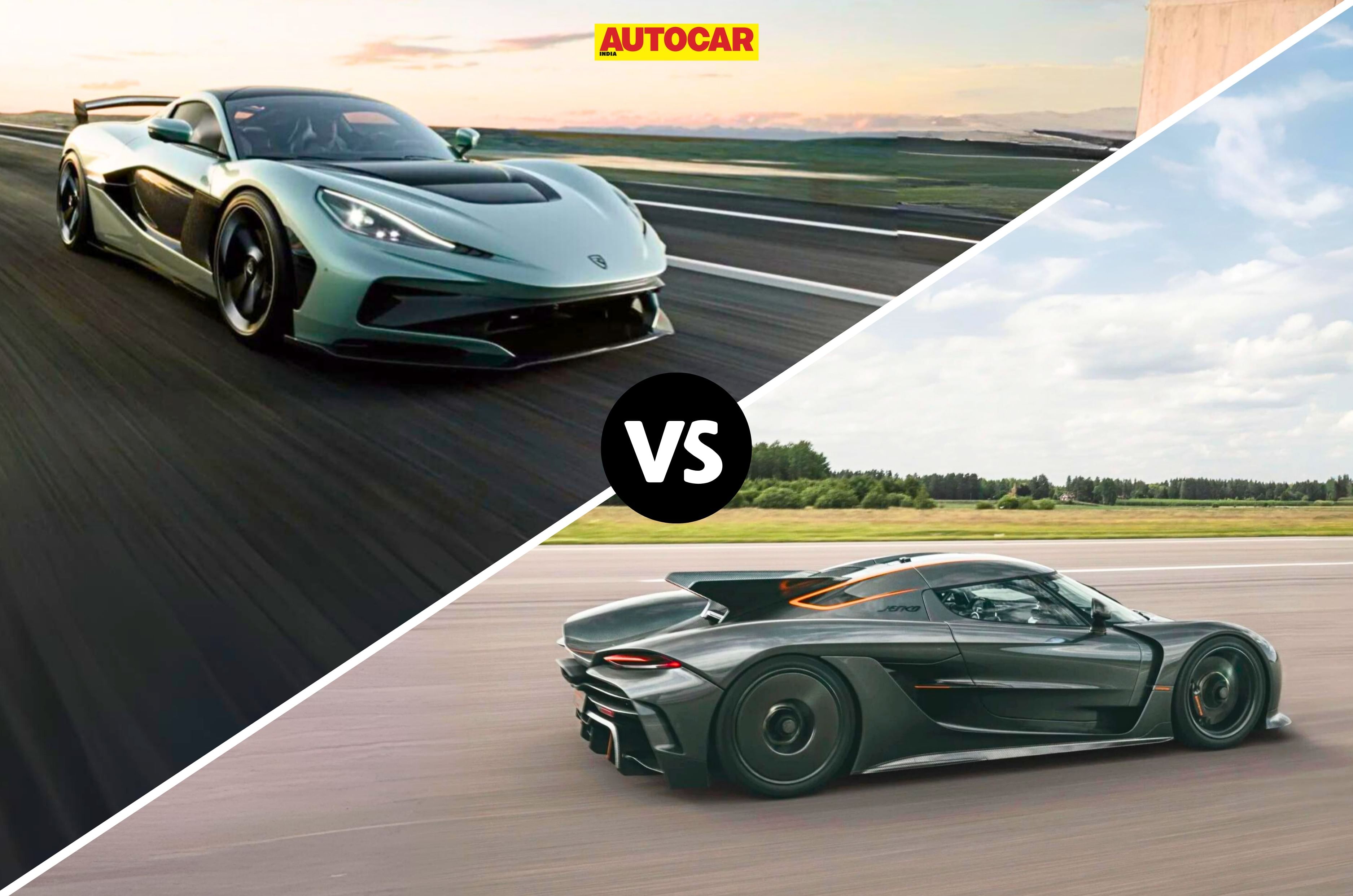
The battle for the ultimate acceleration record has become a high-stakes duel between two titans of speed: Koenigsegg and Rimac. It is more than just a fight for bragging rights; it is a clash of automotive philosophies, where the blistering power of a V8 engine goes head-to-head with the silent, instant-torque violence of electric propulsion.
The metric at the heart of this rivalry is the 0-400-0kph (0-249-0mph) world record - a comprehensive test of a car's ability to not only accelerate with savage speed but also to decelerate with equal ferocity. We take a look at how this record has become the most coveted benchmark in the hypercar world.
The Koenigsegg Jesko Absolut has recently reclaimed the 0-400-0kph world record from the Rimac Nevera R. The back-and-forth between these two hypercar manufacturers has been ongoing, with each company pushing the boundaries of automotive performance.
Koenigsegg vs Rimac: key record times compared

The latest record was set by the Koenigsegg Jesko Absolut, with a time of 25.21 seconds for the 0-400-0kph run. This time beat the Rimac Nevera R's recent record by over half a second. But the first car to officially set the 0-400-0kph record was the Bugatti Chiron way back in 2017, driven by none other than former F1 driver Juan Pablo Montoya. At 41.96 seconds, it was a far cry from the time that has been achieved most recently, but Bugatti set the ball rolling for an upcoming fierce battle between Koenigsegg and Rimac. Let’s take a look at how the rivalry has unfolded over the last few years.
October 2017: Koenigsegg Agera RS (36.44 seconds)
In just about a month’s time after the Chiron set the record, Koenigsegg was quick to snatch it away, first with the Agera RS. The Agera RS did the 0-4000-kph run in 36.44 seconds, shaving 5.52 seconds off the Bugatti’s time. The record-breaking run was achieved with factory driver Niklas Lilja behind the wheel.

September 2019: Koenigsegg Regera (31.49 seconds)
Koenigsegg beat its own record in 2019, this time with the Regera, achieving 0-400-0kph in just 31.49 seconds. The 1500hp Regera was driven down the Rada military airfield by then factory test driver Sonny Persson. One of the biggest technical highlights of the Regera was that it had a one-of-a-kind Direct Drive transmission, meaning there was no traditional gearbox, but power was transferred from the engine to the rear drive axle using a battery, electric motors and hydraulic coupling.

May 2023: Rimac Nevera (29.93 seconds)
The Regera’s record stood for nearly four years until Rimac arrived at the scene and immediately shattered the 30-second barrier with the Nevera, announcing the electric hypercar's arrival as a legitimate world-beater. The quad-motor, 1914hp hypercar did the 0-400kph and back-to-0 run in 29.93 seconds. The team did multiple runs and set an abundance of new records, including a standing quarter mile time.
June 2023: Koenigsegg Regera (28.81 seconds)
Koenigsegg was certainly not staying still with an all-electric hypercar breaking a record it had comfortably held since 2017. In just less than a month’s time, the Koenigsegg Regera reclaimed the title with the 0-400-0kph run coming up 28.81 seconds. Koenigsegg said a quicker time was achieved thanks to better tyres and a smoother track. The record run took place at the Orebro Airport, located west of Stockholm.
July 2024: Koenigsegg Jesko Absolut (27.83 seconds)
 The Jesko Absolut was specifically designed for incredible speeds
The Jesko Absolut was specifically designed for incredible speeds
Next year, Koenigsegg once again bettered its own record with a newer car, the Jesko Absolut. It clocked a time of 27.83 seconds in going from 0 to 400kph and back 0, beating the Regera by 0.98 seconds. The Jesko Absolut was powered by a twin-turbocharged 5.0-liter V8 engine with outputs rated at 1600hp and a whopping 2,177Nm. It ran on E85 fuel and wore standard Michelin Pilot Sport Cup 2 R tires.
July 2025: Rimac Nevera R (25.79 seconds)
Rimac responded with the Nevera R in July 2025. This new iteration of the hypercar was more powerful with 2,017hp on tap, and it clocked the 0-400-0kph run in 25.79 seconds. It was 2.04 seconds quicker than the Jesko Absolut’s 27.83 seconds, and 4.14 seconds faster than the Nevera. The Nevera R didn't just break the 0-400-0kph record – it dominated the day by setting an astonishing 24 different records. Rimac independently conducted the tests at a test track in Germany.
 Nevera R was a more powerful version of the original electric hypercar.
Nevera R was a more powerful version of the original electric hypercar.
August 2025: Koenigsegg Jesko Absolut (25.21 seconds)
Barely a month later, Koenigsegg responded once again. Test driver Markus Lundh piloted the Jesko Absolut to a new record, beating its own previous record by 2.62 seconds, and the Rimac by more than half a second. What makes this feat so remarkable is that it was achieved on a sub-optimal, drying track and with no mechanical changes to the car. The key to victory was a new software update Koenigsegg calls "Absolut Overdrive."
“Beating four-wheel drive electric cars in a straight line is almost magical and shows that ‘truths’ can be rewritten,” said big boss Christian von Koenigsegg.
The story behind those figures is wildly asymmetric though - because in theory, it should be nearly impossible for the Swede to beat the Nevera R despite the latter weighing over two tons.

The Trend: software is the new engine
This latest record from Koenigsegg isn't just a testament to the raw power of its V8; it's a statement about the direction of future automotive performance. The victory was secured not with new hardware, but with code.
Koenigsegg's software engineers developed a system that gives a traditional combustion engine a new level of control, with Christian von Koenigsegg himself noting, "The control we have today equals the control that electric cars have over their motor." This is a significant trend for the industry: horsepower numbers are no longer the only metric that matters. The ability to precisely manage that power, to modulate torque and traction with millisecond accuracy is now the ultimate differentiator.
A glimpse into the future
This rivalry is a microcosm of the automotive industry's broader transition. While most of the world is embracing the inevitable shift to electric vehicles, companies like Koenigsegg are stubbornly proving that the internal combustion engine is not yet a relic. By using advanced software and innovative mechanical solutions, they are demonstrating that there is still room to push the limits of traditional powertrains in ways previously thought impossible.
The question now is not just who will hold the record next, but what technology will they use? Will Rimac respond with a new software update of its own? Or will Koenigsegg continue to refine its "Absolut Overdrive" system to push the record even lower? Only time will tell.
With inputs from Saptarshi Mondal
Also See:
Royal Enfield GRRR Nights X Underground: Motorsport and street cultures meet
Road tripping in the Defender Octa across England's Lake District

